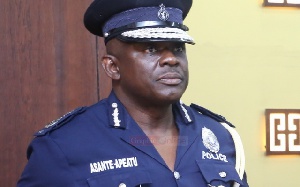 Inspector-General of Police, David Asante-Apeatu
Inspector-General of Police, David Asante-Apeatu
The Inspector-General of Police (IGP), David Asante-Apeatu, has advised personnel of the Public Affairs Directorate (PAD) of the Ghana Police Service to be dynamic in discharging their duties, and in disseminating key information to the public.
According to him, this would leave very little or no room for members of the general public to resort to wrong sources for information, which often created the forum for misinformation, slandering and character assassination.
He averred that it is the expectation of the service that communicators will be technologically up to date, professionally agile and socially conscious in performing their duties.
“As a result, the service, under my leadership, is pursuing a robust transformation aimed at actualizing the vision of the service, that is- to be a world-class Police Service capable of delivering planned, democratic, protective and peaceful services up to the standard of international best practice,” he added.
He gave the advice at the opening of a four-day strategic communications workshop for Police Public Affairs Officers in Accra.
Eighteen of the participants were drawn from both the headquarters and the 11 police regions, with representatives from its key units, including the Police Hospital, the Criminal Investigation Department, the Motor, Transport, Traffic Department, and the Domestic Violence and Victim Support Unit.
The workshop is expected to empower the communicators, as front liners in the Police Service, to be dynamic in their communication strategies in line with current global changes in policing, for their effective engagement with the public.
Asante-Apeatu reminded the Public Affairs Directorate (PAD) that is an interface between the service and the public, it was important that the personnel strictly adhere to high standards of professionalism in all their endeavors.
The IGP noted that the fewer information people had, the more they attacked police officers and perceived them in a bad light, seeing them also as a less educated group.
“I expect the course participants to rejuvenate dull corridors of communication between the service and the public, and also harness the use of modern technologies as a revolutionary tool to speed up access to information and dissemination,” he said.
He said the service was currently positioning itself as one of the best 10 in the world, and also a leader in Africa by the year 2020; and building the capacities of personnel of the PAD was one of the key deliverables of the transformation agenda.
“Effective communication is a means to reach out to the public and draw the attention of the leadership to the views of the population,” he said.
He said the workshop was expected to provide the participants with skills to be able to adopt innovative communication strategies in line with international best practices for effective communications for the Police Service.
David Eklu, Assistant Commissioner of Police (ACP) and the Director-General of the PAD, stated that effective communication was one of the best ways that organizations could use to maintain and sustain useful relationships between them and their stakeholders, both internal and external.
He said the workshop would boost the morale of practitioners, especially in the area of public speaking, writing skills, reputation management, and crisis communication skills in policing.
They would also be oriented on the ongoing transformation program to be effective change agents through the utilization of effective strategic communication techniques.
He said the service had engaged some of the best communication management experts, including Nana Yaa Ofori Atta, Mr. Nanabayin Pratt, and Major Rtd. Don Chebe, to equip the participants with additional knowledge and skills.